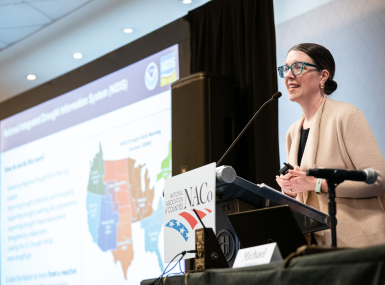Trump rolls back climate rules
Upcoming Events
Related News
Rollback of Clean Power Plan will take months or years and face court challenges
President Donald Trump signed an executive order, “Promoting Energy Independence and Economic Growth,” March 28, to start the process to dismantle climate change policies established under President Barack Obama. The rule also addresses other issues related to barriers that limit domestic energy production.
The cornerstone of the rule centers on Trump’s promise on the campaign trail to revoke the Environmental Protection Agency’s Clean Power Plan (CPP), which is considered to be Obama’s signature effort to combat climate change.
The executive order instructs EPA to review the rule and, “if appropriate, shall, as soon as practicable, suspend, revise, or rescind the guidance, or publish for notice and comment proposed rules suspending, revising, or rescinding those rules.”
Learn More
Presidential Executive Order on Promoting Energy Independence and Economic Growth
Finalized in 2015, CPP was designed to reduce carbon pollution from the electric power sector by 32 percent below 2005 levels by 2030. Almost immediately after the rule was finalized, states and other entities challenged it in court, and in February 2016, the U.S. Supreme Court froze its implementation until those decisions were rendered. But, all of this may be moot because the Trump Administration has asked the U.S. Court of Appeals for the D.C. Circuit to temporarily suspend the lawsuit until EPA concludes their review and potential revisions of CPP.
Trump’s order also addresses federal policies, initiated under the Obama Administration, that limit or prevent further development of domestic energy resources such as oil, coal, nuclear energy and natural gas. The order instructs federal agencies to review rules that “obstruct, delay, curtail, or otherwise impose significant costs on the siting, permitting, production, utilization, transmission or delivery of energy resources.” The agencies are instructed to compile a report that details actions the agencies can take to revise existing barriers. As a result of the executive order, Department of Interior Secretary Ryan Zinke immediately rescinded a 2016 Obama Administration moratorium for coal leasing activities on federal lands and promised to review all agency policies that may impact domestic energy production.
While Trump may use executive orders to address aspects of the Obama Administration’s policies, executive orders cannot be used to overturn regulations. Federal agencies must conform to the Administrative Procedures Act (APA), which lays out specific requirements for revising or repealing rules. Additionally, the administration must provide a strong and legally defensible justification for withdrawing the rule through the APA, and this justification could be vulnerable to legal challenges if is controversial or not sufficiently supported by existing science.
The bottom line is, this process is likely to take months, if not years, and will likely be challenged in the courts.
Attachments
Related News

NOAA outlines help for counties navigating drought’s growing risks
In April, the National Integrated Drought Information System will launch the Mid-Atlantic Drought Early Warning System, which will help county officials allocate resources and attention to mitigate drought-related disasters.

House Agriculture Committee introduces 2026 Farm Bill
On February 13, House Agriculture Committee Chairman G.T. Thompson (R-Pa.-15) introduced the House version of the 2026 Farm Bill, the Farm, Food, and National Security Act of 2026.
